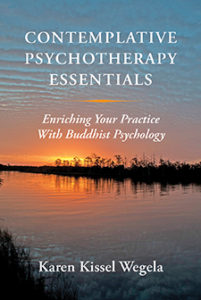“I never started out to write any of my three books,” she says with a hint of laughter, a sense of humility. She is present, personal. She shares her own journey in person and in her books. And no, you don’t need to be Buddhist to experience contemplative psychotherapy.
Wegela sent her first book proposal to a friend and editor at Shambhala publications.
It was “an easy entry.” She was asked to write another book—got the contract through an email. “Both books flowed.”
“My writing style is chatty, like I’m talking. That’s my teaching style, how I speak,” Wegela shared. “The process of getting words on paper (or on the computer) is not hard for me. I was lucky. In the 11th grade I had an English teacher who admired Hemingway. He required us to write simply; it was enormously helpful.”
“When the first book came out I thought, Oh . . . My . . . God . . . , people are going to read this, they’ll hear all of my personal stories. I don’t think about that when I’m writing. I’m pretty out there in all my books,” Wegela said.
“This book was harder to write,” she continued. “It’s not straightforward from a class I had taught. I had to figure out what I wanted to say; I had to ask myself, what do I actually want to say? Once I knew, I had no trouble saying it. I work at making my writing accessible, and when I am stuck I say what I want to say out loud and it comes to me.”
“What really helped me write this book was the question one editor asked, ‘What do you think about when you are with a client, what is your experience?’”
You can read the interview written by Nancy Eichhorn, PhD here.








